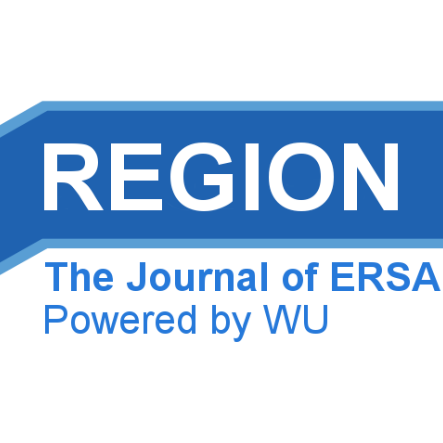Concentration of Resources and Economic Growth
DOI:
https://doi.org/10.18335/region.v2i1.79Abstract
In this letter I summarise the main results and contributions from my Ph.D. thesis on concentration of resources and economic development. The empirical analysis performed in the thesis, and summarised here, focuses on two mayor world trends in modern economic development, namely increasing agglomeration and rising inequalities within countries. In particular, the impact of both trends on long-run economic growth is studied, and results are discussed in light of relevant policy debate.
References
Barca, F., McCann, P., & Rodríguez-Pose, A. (2012). ‘The case for regional development intervention: Place-based versus place-neutral approaches,’ Journal of Regional Science 52(1): 134-152
Brückner, M. (2012). ‘Economic growth, size of the agricultural sector, and urbanization in Africa,’ Journal of Urban Economics 71: 26-36
Castells-Quintana, D. (2015). Malthus living in a slum: Urban concentration, infrastructures and economic growth. AQR-IREA Working Paper 2015/06.
Castells-Quintana, D., and Royuela, V. (2014a). ‘Agglomeration, Inequality and Economic Growth,’ Annals of Regional Science 52: 343-366
Castells-Quintana, D. and Royuela V. (2014b). Tracking positive and negative effects of inequality on long-run grown,’ AQR-IREA working Papers 01/2014
Castells-Quintana, D., and Royuela, V. (2015). ‘Are increasing urbanisation and inequalities symptoms of growth?’ Applied Spatial Analysis and Policy (forthcoming)
Duranton, G. and Puga, D. (2004). ‘Micro-Foundations of Urban Agglomeration Economies,’ In Handbook of Urban and Regional Economics, Vol. 14: Geography and Cities. J.V. Henderson and J-F Thisse (eds.)
Ehrhart, C. (2009). The effects of inequality on growth: a survey of the theoretical and empirical literature. ECINEQ Working Paper Series 2009-107
Galor, O. (2009). Inequality and Economic Development: The Modern Perspective. Edward Elgar Publishing Ltd.
Hansen, N., (1990). ‘Impacts of small and intermediate-sized cities on population distribution: Issues and responses,’ Regional Development Dialogue 11: 60-76.
Henderson, J.V. (2003). ‘The urbanization process and economic growth: The so-what question,’ Journal of Economic Growth 8: 47-71
Henderson, J.V., (2005). ‘Urbanization and Growth,’ In
Handbook of Economic Growth, Vol. 1B: 1543-1591, Philippe Aghion and Steven Durlauf (eds.)
Henderson, J.V., Storeygard, A., and Weil, D. (2012). ‘Measuring economic growth from outer space,’ American Economic Review 102(2): 994-1028
Kuznets, S. (1955). ‘Economic Growth and Income Inequality,’ American Economic Review 45 (March): 1-28
Lewis, W. A. (1954). ‘Economic Development with Unlimited Supplies of Labour,’ The Manchester School 22: 139-191
Marrero G., and Rodriguez, J. (2013). ‘Inequality of opportunity and growth,’ Journal of Development Economics 104: 107-122
Milanovic, B. (2012). ‘Global inequality recalculated and updated: the effect of new PPP estimates on global inequality and 2005 estimates,’ Journal of Economic Inequality 10: 1-18
Neves, P.C., and Silva, S.M.T. (2013). ‘Inequality and growth: Uncovering the main conclusions from the empirics,’ Journal of Development Studies 50(1): 1-21
OECD (2009). How Regions Grow, Paris. Organisation for Economic Cooperation and Development. Paris
Rauch, J. E. (1993). ‘Economic Development, Urban underemployment, and Income Inequality,’ Canadian Journal of Economics 26: 901-18
Rosenthal, S. and Strange, W. (2004). ‘Evidence on the Nature and Sources of Agglomeration Economies,’ In Handbook of Urban and Regional Economics, Vol. 14: Geography and Cities, J.V. Henderson and J-F Thisse (eds.)
Spence, M., Clarke, P., and Buckley, R.M. (Editors). (2009). Urbanization and growth. Commission on Growth and Development. World Bank, Washington.
Todaro, M. (1969). ‘A model of labour migration and rural unemployment in less developed countries,’ American Economic
Review 59(1): 138-148
Todaro, MP. (1997). Economic Development. Longman, London
UN-HABITAT. (2009). United Nations Habitat’s State of the World’s Cities 2008/09 Report
Williamson, J. (1965). ‘Regional inequality and the process on national development,’ Economic Development and Cultural Change 4: 3-47
World Bank. (2009). World Development Report 2009: Reshaping economic geography. World Bank. Washington, DC.
Published
How to Cite
Issue
Section
License
REGION is an open journal, and uses the standard Creative Commons license: Copyright We want authors to retain the maximum control over their work consistent with the first goal. For this reason, authors who publish in REGION will release their articles under the Creative Commons Attribution license. This license allows anyone to copy and distribute the article provided that appropriate attribution is given to REGION and the authors. For details of the rights authors grant users of their work, see the "human-readable summary" of the license, with a link to the full license. (Note that "you" refers to a user, not an author, in the summary.) Upon submission, the authors agree that the following three items are true: 1) The manuscript named above: a) represents valid work and neither it nor any other that I have written with substantially similar content has been published before in any form except as a preprint, b) is not concurrently submitted to another publication, and c) does not infringe anyone’s copyright. The Author(s) holds ERSA, WU, REGION, and the Editors of REGION harmless against all copyright claims. d) I have, or a coauthor has, had sufficient access to the data to verify the manuscript’s scientific integrity. 2) If asked, I will provide or fully cooperate in providing the data on which the manuscript is based so the editors or their assignees can examine it (where possible) 3) For papers with more than one author, I as the submitter have the permission of the coauthors to submit this work, and all authors agree that the corresponding author will be the main correspondent with the editorial office, and review the edited manuscript and proof. If there is only one author, I will be the corresponding author and agree to handle these responsibilities.





